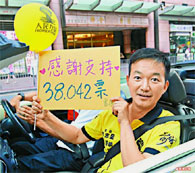Hong Kong now has an openly gay lawmaker. Newly elected People Power (人民力量) representative Raymond Chan Chi-chuen (陳志全) received more than 38,042 votes to win a seat in New Territories East in Sunday's election, beating incumbent and Democratic Party (DP) vice-chairwoman Emily Lau Wai-hing by about 1,000 votes.

The 40-year-old former TV and radio host is said to have come out in an interview with the Cantonese-language Oriental Daily – a day after he won the elections. He said that while he had not tried to hide his sexual orientation, he didn’t come out during the campaign period as he didn’t want it to be the “selling point”.
“I think that if I had announced it publicly during the election, it would have blurred the centre of focus. I would have said so if anyone asked. I do not feel embarrassed about it but neither will I tell it to people.
According to media reports, he said it had always been his platform to push for the implementation of the Sexual Orientation Discrimination Ordinance and will work towards the legal recognition of same-sex marriage, but he did not give a time frame for doing so.
In the same election, Nelson Wong Sing-chi of the Democratic Party lost his bid for re-election in the NT East Constituency. Known to be a Christian conservative and an ardent promoter of conversion therapy, he opposed an amendment to the Domestic Violence Ordinance that would offer gay couples equal protection under the law on the grounds that the amendment would treat same-sex relationships as if they were marriages.
The number of seats in the new Legislative Council (LegCo) term is 70: 35 seats are elected directly by the public ("geographic constituencies") and 35 by groups based on professions ("functional constituencies"), most of which lean pro-Beijing. Under the new complex "one person-two votes" arrangement, voters had two choices, one candidate for their geographical constituency and one for the new District Council (second) functional constituency.











 Printable Version
Printable Version


















Reader's Comments
Please log in to use this feature.